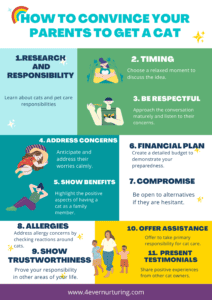Meowing in delight, I pounce upon this opportunity to whisk you away into the world of feline charm and companionship! If you’ve ever longed for a furry friend to call your own, then you’re in the right place. The question that might be troubling you right now is how to convince your parents to get a cat?
So, what is the answer to question how to convince your parents to get a cat? Well, there is no one right answer since parents are different hence it requires a combination of tactics. What can work for my parents is not what might work for your parent and might not certainly work for your friend parents. What is important is to keep in mind some 11 essential things. This includes choosing the right moment to discuss about the idea, showing the benefits, approaching them in a mature manner and listening to their concerns and learning on how to pet and care a cat.

Benefits of Having a Cat
Being aware of the benefits associated with having a cat is the first step on how to convince you parents to get a cat.
Having a cat as a pet comes with a myriad of benefits that extend beyond just their adorable whiskers and playful nature. From physical well-being to emotional support, these enchanting feline companions offer a plethora of advantages that can enrich our lives in more ways than one.
1. Stress Reduction and Improved Mood
It’s a well-known fact that the soft touch of a cat’s fur and the rhythmic sound of their purring can work wonders on our stress levels. Studies have shown that spending time with cats can lead to a reduction in cortisol, the stress hormone. In times of anxiety or melancholy, the presence of a cat can provide a soothing, calming effect, brightening our moods and helping us cope with the challenges life throws our way.
Below is a Personal Anecdote you can use to convince you parents
Personal Anecdote: When I was going through a particularly tough time in college, my roommate’s cat, Luna, became my emotional anchor. Her comforting presence and playful antics were a constant source of joy and helped me stay positive during those challenging days.
2. Companionship and Reduced Loneliness
Cats are renowned for their ability to form strong bonds with their human counterparts. Whether you’re returning from a long day at work or seeking solace after a difficult experience, a cat’s warm welcome and unwavering loyalty can make you feel truly cherished. For those who may feel isolated or lonely, having a cat by their side can alleviate feelings of loneliness, creating a sense of purpose and belonging.
Statistics: According to a survey conducted by the Human-Animal Bond Research Institute (HABRI), 85% of cat owners reported that their feline companions helped them cope with feelings of loneliness and provided a sense of purpose.
3. Physical Health Benefits
Beyond their emotional support, cats can contribute to our physical well-being as well. The gentle act of stroking a cat can lower blood pressure and reduce the risk of heart disease. Additionally, having a cat around the house can encourage physical activity as they often enjoy interactive play, keeping both their owners and themselves active and healthy.
Below is a Personal Anecdote you can use to convince you parents
Personal Anecdote: My friend’s parents, initially hesitant about getting a cat, were surprised to find that their son’s asthma symptoms improved significantly after adopting a hypoallergenic cat breed. The cat’s presence seemed to have a positive impact on his respiratory health.
4. Developing Responsibility and Empathy
Caring for a cat instills a sense of responsibility in pet owners, especially in younger individuals. From feeding and grooming to ensuring their well-being, the process of looking after a cat teaches valuable life skills, fostering maturity and a greater understanding of empathy and compassion.
Statistics: Research show that children who grow up with pets, such as cats, tend to display higher levels of empathy and emotional intelligence.

Addressing Common Concerns Related to Cats
While the idea of bringing a cat into your home might fill your heart with excitement, understand that your parents might have some valid concerns. Let’s address these apprehensions with utmost assurance and provide persuasive solutions to show them that these concerns can be easily overcome.
Allergies and Health Risks
Concern: Your parents might worry about potential allergies or health risks associated with having a cat, especially if someone in the family has allergies.
Solution: Reassure your parents that many cat breeds are hypoallergenic, producing fewer allergens and posing minimal health risks. Additionally, scheduling an allergy test can help identify any specific allergies beforehand. Regular grooming and vacuuming can significantly reduce allergens in the home, making it a more comfortable environment for everyone.
Time and Responsibility
Concern: Your parents may be concerned about the time and responsibility involved in caring for a cat, especially if they already have a busy schedule.
Solution: Emphasize that cat care can be manageable and even enjoyable when shared among family members. Assigning specific tasks like feeding, cleaning the litter box, and playtime can create a structured routine, ensuring everyone contributes to the cat’s well-being. This shared responsibility will strengthen family bonds and teach valuable life skills.
Read About: How to Make Your Parents Buy You a Phone
Damage to Furniture and Belongings
Concern: Your parents might worry about potential damage to furniture and belongings from scratching and playing.
Solution: Highlight the availability of cat scratching posts and toys designed to keep cats engaged and prevent destructive behavior. Regular nail trimming and providing appropriate outlets for play will redirect their energy away from household items. Remind your parents that with proper training and a little foresight, any potential damage can be avoided.
Cost of Pet Ownership
Concern: Your parents might be wary of the financial commitment associated with owning a cat, including expenses for food, veterinary care, and other supplies.
Solution: Illustrate that while there are initial costs, the long-term financial commitment is manageable with proper budgeting. Consider discussing the idea of creating a cat fund, where family members can contribute a small amount regularly to cover expenses. Additionally, adopting from a shelter is a cost-effective and compassionate option that also provides a loving home to a cat in need.
Travel and Vacations
Concern: Your parents might be concerned about what to do with the cat when the family goes on vacation.
Solution: Explain that various solutions are available, such as asking a trusted friend or family member to cat-sit, hiring a professional pet-sitter, or boarding the cat at a reputable pet hotel. Many options ensure your furry friend is well-cared for while the family enjoys their time away.

Preparing For a Cat
Before the pitter-patter of tiny paws fills your home with joy, it’s crucial to take practical steps to ensure a smooth and fulfilling transition for both your family and your new feline friend. Being well-prepared demonstrates your commitment to responsible pet ownership, setting the stage for a happy and harmonious life together.
Below are some of the essential considerations and preparations you should make before getting a cat:
Research and Choose the Right Cat
Cats come in various breeds, each with distinct personalities and care requirements. Research different breeds to find one that suits your family’s lifestyle and preferences. Consider factors such as energy levels, grooming needs, and compatibility with children or other pets. Remember, adopting from a shelter can offer a loving home to a cat in need while providing you with a wonderful companion.
Create a Cat-Friendly Environment
Cats appreciate having their designated space. Set up a cozy and safe area with a bed, scratching post, toys, and a litter box. Cats are territorial creatures, so having a comfortable space to call their own will help them feel secure and welcome.
Cat-Proof Your Home
Cats are naturally curious and agile, so it’s essential to cat-proof your living space. Remove any hazardous substances, plants, or small objects that a cat might ingest. Secure cords and cables, and ensure windows have sturdy screens to prevent accidents.
Read About: How to Make $ 1000 as A Teenager
Litter Box Training
Proper litter box training is crucial for your cat’s well-being and the cleanliness of your home. Place the litter box in a quiet, easily accessible area. Show your cat the box when you first bring them home and be patient as they get used to using it. Regularly clean the litter box to keep it inviting for your furry companion.
Gather Essential Supplies
Before your new cat arrives, ensure you have all the necessary supplies, including food and water bowls, high-quality cat food, a comfortable bed, toys, grooming tools, and a carrier for trips to the vet.
Arrange a Vet Check-Up
Schedule a visit to the veterinarian shortly after bringing your cat home. A thorough check-up will ensure your cat is healthy and up-to-date on vaccinations. The vet can also offer advice on diet, grooming, and any specific health needs your cat may have.
Set House Rules
Establishing house rules for both your family and your cat will help create a structured and happy environment. Decide on areas where the cat is allowed or not allowed, and ensure all family members are on the same page regarding cat care and responsibilities.
Allocate Time for Play and Interaction
Cats thrive on play and interaction. Dedicate time each day to engage in interactive play with your cat, as this helps build a strong bond and keeps them mentally stimulated and physically active.

Tips and Strategies for Convincing Parents to Get a Cat
Yearning to bring a cat’s charm and affection into your life and do not know how to convince you parents to get a cat? Lucky, the moment has come to make your case to your parents! With the right approach and a sprinkle of persuasion, you can turn their hesitations into purr-fections.
Below are some tips and strategies to help you on your persuasive journey:
1. Appeal to Their Emotions
Engage your parents’ hearts by sharing heartwarming stories of cats providing comfort and companionship to individuals in challenging situations. Highlight how a cat’s affectionate purrs and gentle nuzzles can alleviate stress and bring joy to the family. Emphasize that a feline friend can enhance the family dynamic, creating unforgettable memories and treasured moments.
2. Demonstrate Responsibility
Show your parents that you are ready for the responsibility of pet ownership. Outline a plan detailing how you will contribute to the care of the cat, from feeding and grooming to cleaning the litter box. Assure them that you understand the commitment involved and are willing to take on these responsibilities diligently.
3. Present the Benefits
Remind your parents of the numerous benefits that come with having a cat. Mention the emotional support they offer, the positive effects on mental well-being, and the joy of having a furry friend to come home to. Stress how the presence of a cat can create a warm and welcoming atmosphere in the household.
4. Address Concerns Proactively
Show your parents that you’ve considered their concerns and have practical solutions in mind. Share your research on hypoallergenic breeds if allergies are a concern. Explain how you will cat-proof the house and manage any potential damage to furniture. Knowing that you’ve thought through these issues will give them confidence in your readiness.
5. Invite Them to Meet Cats
Encourage your parents to spend time around cats, either by visiting a shelter or spending time with friends or family who have cats. Sometimes, firsthand experience with the affection and joy a cat brings can sway their opinions.
6. Highlight Learning Opportunities
Explain how having a cat can be an incredible learning experience for everyone in the family. From understanding animal behavior to fostering empathy and responsibility, having a cat can be a valuable educational journey for all.
7. Be Patient and Persistent
Convincing your parents might not happen overnight. Be patient and willing to discuss their concerns as many times as needed. Avoid pressuring or begging, but instead, present your case with confidence and conviction. Show them that your desire for a cat is not a fleeting whim but a well-considered decision.
Conclusion
Convincing your parents to welcome a cat requires a blend of passion and preparation. By appealing to their emotions, showcasing responsibility, and highlighting the benefits, you can embark on a journey of love and companionship. Let patience and persistence guide you towards the enchanting world of feline friendship, creating cherished memories that will last a lifetime.







